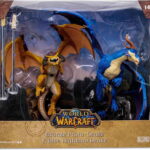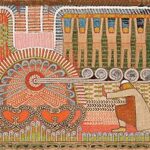The Myth of Nezha: A Unique Birth in World Mythology
Across world mythologies, heroes often emerge from extraordinary beginnings, but few are as bizarre and fascinating as the birth of Nezha, a central figure in Chinese folklore. Unlike the demigod Hercules—born from Zeus’s infidelity—or prophetic figures like Moses or Jesus in Abrahamic traditions, Nezha’s origin defies natural laws in ways that reflect Taoist and Buddhist influences. This article explores why his birth stands apart and what it reveals about Chinese cultural values.
The Miraculous Birth of Nezha
Nezha’s origin story begins not with conventional conception but with a divine anomaly. According to the Fengshen Yanyi (“Investiture of the Gods”), he was born as a flesh ball after his mother carried him for an unnatural three years and six months. His father, General Li Jing, assumed it was a monstrous omen and slashed the ball open, revealing a fully formed child adorned with mystical symbols—wristbands and a golden sash. This “unnatural” birth mirrors Taoist beliefs in rebellion against cosmic order, contrasting sharply with Hercules’ semi-divine lineage or Moses’ hidden infancy under divine protection. While figures in Abrahamic faiths often embody predestined roles, Nezha’s defiance of biology and societal norms (like rejecting filial piety) underscores his role as a liminal figure—neither wholly human nor god at birth.
Nezha vs. Hercules and Abrahamic Figures: A Comparative Lens
Where Hercules’ strength stems from his Olympian bloodline and biblical heroes like Isaac or John the Baptist are born under miraculous but biologically coherent circumstances, Nezha’s existence challenges the very boundaries of life and form. His flesh-ball birth symbolizes:
- Rejection of Confucian norms—unlike Moses, whose survival affirms divine will, Nezha’s violent emergence subverts expectations of filial duty.
- Ambiguity as power—while Jesus’ virgin birth reinforces purity, Nezha’s formlessness reflects Taoist ideas of transformation.
- Divine autonomy—Hercules’ fate is tied to Zeus, but Nezha’s deeds (like slaying a dragon) are self-determined acts of chaos-balancing.
This distinction highlights how Chinese mythology prioritizes cosmological harmony over linear divine plans—a hero born from disorder must ultimately restore balance.
Conclusion: Nezha’s Birth as Cultural Counterpoint
Nezha’s origin story—a flesh ball wielding cosmic weapons—transcends mere fantastical detail. It encapsulates Taoist fluidity, Confucian tension, and a worldview where heroes emerge from defiance, not destiny. Unlike Hercules’ inherited might or Abrahamic prophets’ ordained roles, Nezha embodies self-creation, making his myth uniquely resonant in global folklore. His tale invites reflection on how cultures imagine the intersection of power, rebellion, and the unnatural.

